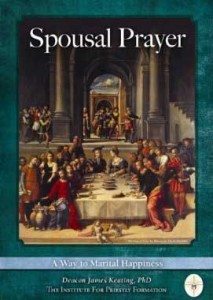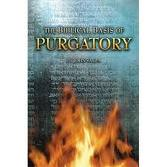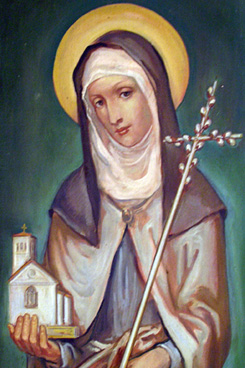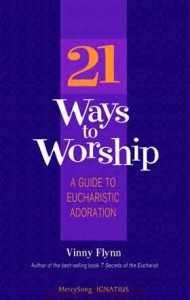[powerpress]
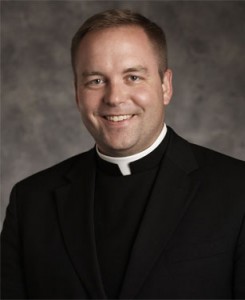 This is talk 1 of a 2-part presentation on “Spousal Prayer – A Way to Marital Happiness” based on the book by Deacon James Keating Ph.D. as offered by the Family Life Office of the Archdiocese of Omaha.
This is talk 1 of a 2-part presentation on “Spousal Prayer – A Way to Marital Happiness” based on the book by Deacon James Keating Ph.D. as offered by the Family Life Office of the Archdiocese of Omaha.
Fr. Paul Hoesing offers the first reflection on this subject.  He discusses the value of silence and receptivity in our prayer.  Then he moves on to the fundamental elements of “Spousal Prayer”:  Beholding, Listening, Forgiving.
Here are the images Fr. Hoesing references in this talk:
- The Annunication -ref 1
- Joachim & Anna – Giotto – ref 2
- Rembrandt – ref 3
- Joseph & Mary – ref 4
Fr. Paul Hoesing serves as the Vocation Director for the Archdiocese of Omaha, NE. He also serves as the President of the The National Conference of Diocesan Vocation Directors which promotes diocesan priesthood, providing resources for the formation, support, and advocacy of diocesan vocation directors as they work within the Catholic Church to foster a culture of vocations, raising up new priests for the Body of Christ.
Â
This entry was posted on Monday, February 9th, 2015 at 1:57 pm
You can follow any responses to this entry through the RSS 2.0 feed.

Faith Check/Greg Youell
Purgatory
[powerpress]
Few Catholic doctrines are more disputed than that of purgatory. And yet, if it is properly understood, we see that purgatory is a gift of God’s mercy.Â
Jesus did not come to merely forgive the penalty for our sins, but to cleanse us and make us His new creations.
Revelation 21:27 says, “nothing impure will enter heaven.â€Â Those of us who die in a state of grace—or are “savedâ€â€”and still have selfishness and sin remaining on our souls, must undergo a purification before entrance into heaven is possible.
So purgatory is not a second chance at heaven, but simply a final stage of growing in holiness.
Notice that Jesus in Matthew 12 speaks of sins that will “not be forgiven in this age or in the age to come.†1 And in 1 Corinthians 3, St. Paul writes that on Judgment Day there will be some who “suffer loss… [they will still] be saved, but only as through fire.â€2
C.S. Lewis, the famous Anglican Christian writer, believed in purgatory and compared it to the burning sensation of mouthwash after having one’s tooth pulled at the dentist’s office.3
Indeed, while purgatory may involve pain, it will not be without joy, for it is the threshold to the gates of paradise.
1 -Â 12:32
2 -Â 3:15
3 -Â Letters to Malcolm: Chiefly on Prayer, 107-109.
Tags: catholic, catholic podcast, catholic prayer, cathollc spirituality
This entry was posted on Sunday, November 2nd, 2014 at 1:05 am
You can follow any responses to this entry through the RSS 2.0 feed.
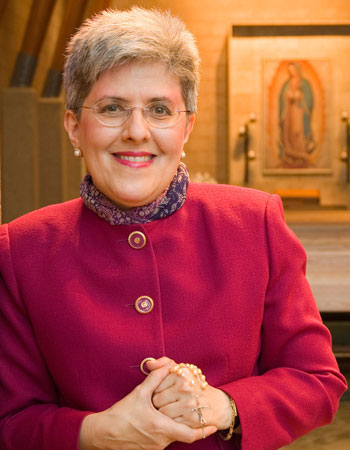 No one I know has the passion, zeal and just shear love for the Holy Souls in Purgatory like Susan Tassone! She has an incredible depth of knowledge on the subject. You will never feel you are without companinons on the journey after you hear Susan plead the Holy Souls cause.
No one I know has the passion, zeal and just shear love for the Holy Souls in Purgatory like Susan Tassone! She has an incredible depth of knowledge on the subject. You will never feel you are without companinons on the journey after you hear Susan plead the Holy Souls cause.
[powerpress]
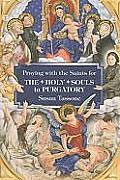 Â You can find the book here
 You can find the book here
Let the saints inspire you to intercede for the holy souls in purgatory!
Throughout the ages the devotions, prayers, and practices of the Communion of Saints have been offered up on behalf of souls in purgatory, the Church Suffering. The saints ardent desire to intercede for the holy souls impelled them to pray ceaselessly for their eternal rest.
This inspiring book shows how you can join the saints in this act of divine charity, thereby attaining spiritual gifts for acts done for the souls that cry out to us for relief.
–See the firsthand experiences that saints have had with the holy souls
–Learn the power of intercessory prayer on behalf of souls in purgatory
–Seasonal Devotions & Spiritual Aids prepare all members of the family to plead the cause of souls
Tags: catholic, catholic podcast, catholic prayer, cathollc spirituality, holy souls, holy souls in purgatory, Susan Tassone
This entry was posted on Sunday, November 2nd, 2014 at 12:42 am
You can follow any responses to this entry through the RSS 2.0 feed.
I love talking with John Salza…tough doctrine and dogma that for most of us is difficult to explain, is just so easy for John. And he shares his knowledge with all of us…what a gift!
just so easy for John. And he shares his knowledge with all of us…what a gift!
John’s website is www.scripturecatholic.com
[powerpress]
From the book description:
In The Biblical Basis for Purgatory, John  offers the definitive scriptural explanation of this distinctively Catholic doctrine. Building on the teachings of Christ and St. Paul, he shows how the existence of a place of temporal punishment after death is not only a logical extension of what we know about the reality of sin and God’s justice, but is also a supreme expression of God’s love and mercy. Although Purgatory is a place of mercy, its pains are real, and they are severe. This book does more than defend and explain Purgatory it provides a solid plan, drawn from the Church s perennial wisdom for conquering our sins by God s grace, while still on earth.
Tags: biblical basis, catholic, catholic podcast, catholic prayer, cathollc spirituality, john salza, purgatory
This entry was posted on Sunday, November 2nd, 2014 at 12:32 am
You can follow any responses to this entry through the RSS 2.0 feed.
The Novena for Holy Souls in Purgatory, Day 9
composed by by St. Alphonsus of Liguori
[powerpress]
My God! How was it possible that I, for so many years, have borne tranquilly the separation from Thee and Thy holy grace! O infinite Goodness, how long-suffering hast Thou shown Thyself to me! Henceforth, I shall love Thee above all things. I am deeply sorry for having offended Thee; I promise rather to die than to again offend Thee. Grant me the grace of holy perseverance, and do not permit that I should ever again fall into sin. Have compassion on the holy souls in Purgatory. I pray Thee, moderate their sufferings; shorten the time of their misery; call them soon unto Thee in heaven, that they may behold Thee face to face, and forever love Thee. Mary, Mother of Mercy, come to their aid with thy powerful intercession, and pray for us also who are still in danger of eternal damnation.
Say the following prayers: 1 Our Father… 1 Hail Mary… The Prayer to Our Suffering Saviour for the Holy Souls in Purgatory found below.
Visit the Discerning Hearts “Holy Souls†page for the complete novena and text of the prayers
Tags: catholic, catholic podcast, catholic prayer, cathollc spirituality, heaven, holy souls, holy souls in purgatory, intercession, prayers, purgatory, sin, souls in purgatory
This entry was posted on Saturday, November 1st, 2014 at 12:01 am
You can follow any responses to this entry through the RSS 2.0 feed.
The Novena for Holy Souls in Purgatory, Day 8
composed by by St. Alphonsus of Liguori
[powerpress]
Oh my God! I also am one of these ungrateful beings, having received so much grace, and yet despised Thy love and deserved to be cast by Thee into hell. But Thy infinite goodness has spared me until now. Therefore, I now love Thee above all things, and I am heartily sorry for having offended Thee. I will rather die than ever offend Thee. Grant me the grace of holy perseverance. Have compassion on me and, at the same time, on the holy souls suffering in Purgatory.
Say the following prayers: 1 Our Father… 1 Hail Mary… The Prayer to Our Suffering Saviour for the Holy Souls in Purgatory found below.
Visit the Discerning Hearts “Holy Souls†page for the complete novena and text of the prayers
Tags: catholic, catholic podcast, catholic prayer, cathollc spirituality, hell, holy souls, holy souls in purgatory, prayers, purgatory, souls in purgatory, suffering
This entry was posted on Friday, October 31st, 2014 at 12:47 am
You can follow any responses to this entry through the RSS 2.0 feed.
The Novena for Holy Souls in Purgatory, Day 2
composed by by St. Alphonsus of Liguori
[powerpress]
Woe to me, unhappy being, so many years have I already spent on earth and have earned naught but hell! I give Thee thanks, O Lord, for granting me time even now to atone for my sins. My good God, I am heartily sorry for having offended Thee. Send me Thy assistance, that I may apply the time yet remaining to me for Thy love and service; have compassion on me, and, at the same time, on the holy souls suffering in Purgatory. O Mary, Mother of God, come to their assistance with thy powerful intercession.
Say the following prayers: 1 Our Father… 1 Hail Mary… The Prayer to Our Suffering Saviour for the Holy Souls in Purgatory found below.
Visit the Discerning Hearts “Holy Souls†page for the complete novena and text of the prayers
Tags: catholic, catholic podcast, catholic prayer, cathollc spirituality, holy souls, holy souls in purgatory, intercession, poor souls, prayers, purgatory, st alphonsus, suffering
This entry was posted on Saturday, October 25th, 2014 at 12:04 am
You can follow any responses to this entry through the RSS 2.0 feed.

Faith Check/Greg Youell
Confession is Good Medicine
[powerpress]
FC 16 – Confession is Good Medicine
A trip to the doctor’s office can be a scary thing, but it’s often necessary to go there to get the healing and treatment that we need.
Likewise, going to the confessional can be intimidating, but it’s often the very thing that we need to get us back on the pathway to the Lord.
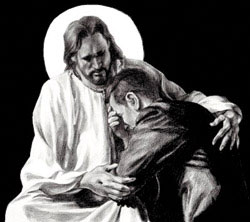 While we should also privately repent of our sins to God, Jesus instituted the sacrament of reconciliation or penance for our own good. Statistics show that Catholic populations have historically had lower rates of suicide and depression than non-Catholics, which many psychologists attribute directly to the healthy practice of vocally confessing one’s sins.
While we should also privately repent of our sins to God, Jesus instituted the sacrament of reconciliation or penance for our own good. Statistics show that Catholic populations have historically had lower rates of suicide and depression than non-Catholics, which many psychologists attribute directly to the healthy practice of vocally confessing one’s sins.
Few things can be as liberating as getting all of the junk from our lives out there on the table. The priest stands as Christ’s representative whose words of absolution, “I forgive you in the name of the Father and the Son and the Holy Spirit,†act as a sweet healing balm upon our souls. Priests are not their to scold you, but to offer healing and a fresh start.
So be not afraid, come unload your burdens before the Lord in confession today.
Tags: catholic, catholic podcast, catholic prayer, cathollc spirituality, confession, penance, reconciliation
This entry was posted on Friday, October 17th, 2014 at 12:21 pm
You can follow any responses to this entry through the RSS 2.0 feed.
Confession to Priests

Faith Check/Greg Youell
[powerpress]
On this Faith Check let’s take a look at a common question: why confess your sins to a priest instead of straight to God?
First, Catholics are encouraged to privately confess our sins to God all the time and every single Mass begins with a penitential rite in which we do exactly this.
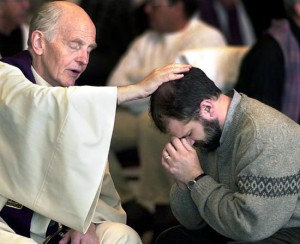 Still we should regularly go to the sacrament of confession or reconciliation. Remember that in the Old Testament a Hebrew was to publicly go to the temple and offer a sacrifice for his sin. In John 20, our Lord gives the apostles authority to forgive sins in his name, when He breathed the Holy Spirit on them and said “whose sins you forgive are forgiven them, and whose sins you retain are retained.†1 In 2 Corinthians Paul also notes that the apostles are Christ’s ambassadors who have been given the ministry of reconciliation.2
Still we should regularly go to the sacrament of confession or reconciliation. Remember that in the Old Testament a Hebrew was to publicly go to the temple and offer a sacrifice for his sin. In John 20, our Lord gives the apostles authority to forgive sins in his name, when He breathed the Holy Spirit on them and said “whose sins you forgive are forgiven them, and whose sins you retain are retained.†1 In 2 Corinthians Paul also notes that the apostles are Christ’s ambassadors who have been given the ministry of reconciliation.2
Early Christian records show that the early Church always understood this according to the Catholic view3:those who sinned gravely after baptism could be reconciled to the Church through confession to the priests, who do not stand as barriers to Christ, but as his ambassadors, who lovingly take us by the hand and restore us to grace after we have fallen.
1 -Â Jn. 20:23
2 -Â 5:18-20
3 – See Catholic Answers website on subject: http://www.catholic.com/library/Confession.asp
Tags: catholic, catholic apologetics, catholic podcast, catholic prayer, cathollc spirituality, confession, penance, reconciliation
This entry was posted on Monday, October 6th, 2014 at 12:01 am
You can follow any responses to this entry through the RSS 2.0 feed.
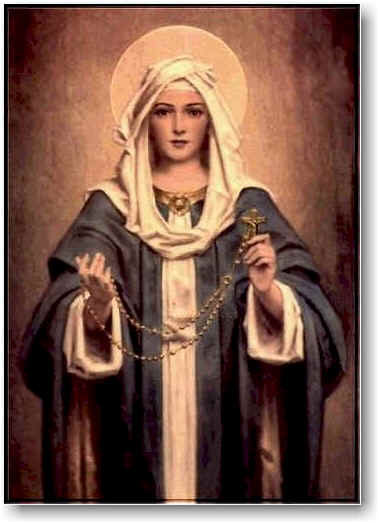 Outside of the Sacramental prayers of the Church, for me, there is no other prayer more important then the prayerful recitation of the Holy Rosary of the Blessed Virgin Mary.
Outside of the Sacramental prayers of the Church, for me, there is no other prayer more important then the prayerful recitation of the Holy Rosary of the Blessed Virgin Mary.
Our late great Holy Father, St. John Paul II put it beautifully in His Apostolic Letter On the Rosary of the Virgin Mary:
“A path of contemplation”
“But the most important reason for strongly encouraging the practice of the Rosary is that it represents a most effective means of fostering among the faithful that commitment to the contemplation of the Christian mystery which I have proposed in the Apostolic Letter Novo Millennio Ineunte as a genuine “training in holinessâ€: “What is needed is a Christian life distinguished above all in the heart of The Rosary belongs among the finest and most praiseworthy traditions of Christian contemplation. Developed in the West, it is a typically meditative prayer, corresponding in some way to the “prayer of the heart†or “Jesus prayer†which took root in the soil of the Christian East.”- His Apostolic Letter On the Rosary of the Virgin Mary
Please take some time to check out the Discerning Hearts “Holy Rosary Page”
Audio mp3 download/podcasts of the Holy Rosary
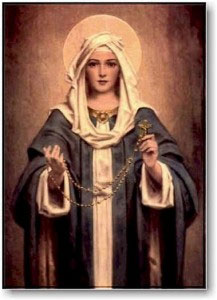 Joyful Mysteries
Joyful Mysteries
[powerpress]
Sorrowful Mysteries
[powerpress url=”http://www.old.discerninghearts.com/Devotionals/Rosary-Sorrowful-Mysteries.mp3″]Download (right click & choose “Save Link As”)
Luminous Mysteries
[powerpress url=”http://www.old.discerninghearts.com/Devotionals/Rosary-Luminous-Mysteries.mp3″]Download (right click & choose “Save Link As”)
Glorious Mysteries
[powerpress url=”http://www.old.discerninghearts.com/Devotionals/Rosary-Glorious-Mysteries.mp3″]Download (right click & choose “Save Link As”)

meditative music provided by
Â
Tags: Apostolic Letter, Apostolic Letter Novo Millennio Ineunte, catholic, catholic podcast, catholic prayer, cathollc spirituality, the Blessed Virgin Mary, The Virgin Mary, virgin mary
This entry was posted on Wednesday, October 1st, 2014 at 12:21 am
You can follow any responses to this entry through the RSS 2.0 feed.
 Episode 3 Salvation Begins Now: Last Things First – Â Deacon Keating continues reflecting on the reality of Purgatory. Â He discusses the teachings of the saints. Â What do our current sufferings on earth compare to purgatory? Â What does the sacrament of reconciliation offer us in this understanding?
Episode 3 Salvation Begins Now: Last Things First – Â Deacon Keating continues reflecting on the reality of Purgatory. Â He discusses the teachings of the saints. Â What do our current sufferings on earth compare to purgatory? Â What does the sacrament of reconciliation offer us in this understanding?
[powerpress]
From the Catechism of the Catholic Church:
1030 All who die in God’s grace and friendship, but still imperfectly purified, are indeed assured of their eternal salvation; but after death they undergo purification, so as to achieve the holiness necessary to enter the joy of heaven
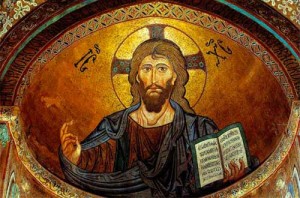
Deacon James Keating, PhD, the director of Theological Formation for the Institute for Priestly Formation, located at Creighton University, in Omaha.
For more information on the “Institute of Priestly Formation” and for other material available by Deacon Keating, just click here
Don’t forget to pickup a copy of “Communion with Christ” , it is one of the best audio sets on prayer…ever!
Check out Deacon Keating’s “Discerning Heart” page
Tags: catholic, catholic podcast, catholic prayer, cathollc spirituality, creighton university, institute for priestly formation, purgatory
This entry was posted on Wednesday, September 17th, 2014 at 9:49 am
You can follow any responses to this entry through the RSS 2.0 feed.
 Episode 2 Salvation Begins Now: Last Things First –  What is  Death?  Why do we fail to contemplate it’s truth…why do we fear it?  What is Purgatory?  Why is there a need for final purgation?
Episode 2 Salvation Begins Now: Last Things First –  What is  Death?  Why do we fail to contemplate it’s truth…why do we fear it?  What is Purgatory?  Why is there a need for final purgation?
[powerpress]
From the Catechism of the Catholic Church:
1030 All who die in God’s grace and friendship, but still imperfectly purified, are indeed assured of their eternal salvation; but after death they undergo purification, so as to achieve the holiness necessary to enter the joy of heaven

Deacon James Keating, PhD, the director of Theological Formation for the Institute for Priestly Formation, located at Creighton University, in Omaha.
For more information on the “Institute of Priestly Formation” and for other material available by Deacon Keating, just click here
Don’t forget to pickup a copy of “Communion with Christ” , it is one of the best audio sets on prayer…ever!
Check out Deacon Keating’s “Discerning Heart” page
Tags: catholic, catholic podcast, catholic prayer, cathollc spirituality, creighton university, death, institute for priestly formation, last things, purgatory
This entry was posted on Tuesday, August 19th, 2014 at 4:00 pm
You can follow any responses to this entry through the RSS 2.0 feed.
Vatican City, Sep 15, 2010 Pope Benedict’s General Audience, from Vatican.va
Saint Clare of Assisi
Dear Brothers and Sisters,
One of the best loved Saints is without a doubt St Clare of Assisi who lived in the 13th century and was a contemporary of St Francis. Her testimony shows us how indebted the Church is to courageous women, full of faith like her, who can give a crucial impetus to the Church’s renewal.
So who was Clare of Assisi? To answer this question we possess reliable sources: not only the ancient biographies, such as that of Tommaso da Celano, but also the Proceedings of the cause of her canonization that the Pope promoted only a few month after Clare’s death and that contain the depositions of those who had lived a long time with her.
Born in 1193, Clare belonged to a wealthy, aristocratic family. She renounced her noble status and wealth to live in humility and poverty, adopting the lifestyle that Francis of Assisi recommended. Although her parents were planning a marriage for her with some important figure, as was then the custom, Clare, with a daring act inspired by her deep desire to follow Christ and her admiration for Francis, at the age of 18 left her family home and, in the company of a friend, Bona di Guelfuccio, made her way in secret to the Friars Minor at the little Church of the Portiuncula. It was the evening of Palm Sunday in 1211. In the general commotion, a highly symbolic act took place: while his companions lit torches, Francis cut off Clare’s hair and she put on a rough penitential habit. From that moment she had become the virgin bride of Christ, humble and poor, and she consecrated herself totally to him. Like Clare and her companions, down through history innumerable women have been fascinated by love for Christ which, with the beauty of his Divine Person, fills their hearts. And the entire Church, through the mystical nuptial vocation of consecrated virgins, appears what she will be for ever: the pure and beautiful Bride of Christ.
In one of the four letters that Clare sent to St Agnes of Prague the daughter of the King of Bohemia, who wished to follow in Christ’s footsteps, she speaks of Christ, her beloved Spouse, with nuptial words that may be surprising but are nevertheless moving: “When you have loved [him] you shall be chaste; when you have touched [him] you shall become purer; when you have accepted [him] you shall be a virgin. Whose power is stronger, whose generosity is more elevated, whose appearance more beautiful, whose love more tender, whose courtesy more gracious. In whose embrace you are already caught up; who has adorned your breast with precious stones… and placed on your head a golden crown as a sign [to all] of your holiness” (First Letter to Blessed Agnes of Prague: FF,2862).
Especially at the beginning of her religious experience, Francis of Assisi was not only a teacher to Clare whose teachings she was to follow but also a brotherly friend. The friendship between these two Saints is a very beautiful and important aspect.
Indeed, when two pure souls on fire with the same love for God meet, they find in their friendship with each other a powerful incentive to advance on the path of perfection. Friendship is one of the noblest and loftiest human sentiments which divine Grace purifies and transfigures.
Like St Francis and St Clare, other Saints too experienced profound friendship on the journey towards Christian perfection. Examples are St Francis de Sales and St Jane Frances de Chantal. And St Francis de Sales himself wrote: “It is a blessed thing to love on earth as we hope to love in Heaven, and to begin that friendship here which is to endure for ever there. I am not now speaking of simple charity, a love due to all mankind, but of that spiritual friendship which binds souls together, leading them to share devotions and spiritual interests, so as to have but one mind between them” (The Introduction to a Devout Life, III, 19).
After spending a period of several months at other monastic communities, resisting the pressure of her relatives who did not at first approve of her decision, Clare settled with her first companions at the Church of San Damiano where the Friars Minor had organized a small convent for them. She lived in this Monastery for more than 40 years, until her death in 1253. A first-hand description has come down to us of how these women lived in those years at the beginning of the Franciscan movement. It is the admiring account of Jacques de Vitry, a Flemish Bishop who came to Italy on a visit. He declared that he had encountered a large number of men and women of every social class who, having “left all things for Christ, fled the world. They called themselves Friars Minor and Sisters Minor [Lesser] and are held in high esteem by the Lord Pope and the Cardinals…. The women live together in various homes not far from the city. They receive nothing but live on the work of their own hands. And they are deeply troubled and pained at being honoured more than they would like to be by both clerics and lay people” (Letter of October 1216:Â FF, 2205, 2207).
Jacques de Vitry had perceptively noticed a characteristic trait of Franciscan spirituality about which Clare was deeply sensitive: the radicalism of poverty associated with total trust in Divine Providence. For this reason, she acted with great determination, obtaining from Pope Gregory IX or, probably, already from Pope Innocent III, the so-called Privilegium Paupertatis (cf. FF.,3279). On the basis of this privilege Clare and her companions at San Damiano could not possess any material property. This was a truly extraordinary exception in comparison with the canon law then in force but the ecclesiastical authorities of that time permitted it, appreciating the fruits of evangelical holiness that they recognized in the way of life of Clare and her sisters. This shows that even in the centuries of the Middle Ages the role of women was not secondary but on the contrary considerable. In this regard, it is useful to remember that Clare was the first woman in the Church’s history who composed a written Rule, submitted for the Pope’s approval, to ensure the preservation of Francis of Assisi’s charism in all the communities of women large numbers of which were already springing up in her time that wished to draw inspiration from the example of Francis and Clare.
In the Convent of San Damiano, Clare practised heroically the
virtues that should distinguish every Christian: humility, a spirit of piety and penitence and charity. Although she was the superior, she wanted to serve the sick sisters herself and joyfully subjected herself to the most menial tasks. In fact, charity overcomes all resistance and whoever loves, joyfully performs every sacrifice. Her faith in the Real Presence of Christ in the Eucharist was so great that twice a miracle happened. Simply by showing to them the Most Blessed Sacrament distanced the Saracen mercenaries, who were on the point of attacking the convent of San Damiano and pillaging the city of Assisi.
Such episodes, like other miracles whose memory lives on, prompted Pope Alexander IV to canonize her in 1255, only two years after her death, outlining her eulogy in the Bull on the Canonization of St Clare. In it we read: “How powerful was the illumination of this light and how strong the brightness of this source of light. Truly this light was kept hidden in the cloistered life; and outside them shone with gleaming rays; Clare in fact lay hidden, but her life was revealed to all. Clare was silent, but her fame was shouted out” (FF, 3284). And this is exactly how it was, dear friends: those who change the world for the better are holy, they transform it permanently, instilling in it the energies that only love inspired by the Gospel can elicit. The Saints are humanity’s great benefactors!
St Clare’s spirituality, the synthesis of the holiness she proposed is summed up in the fourth letter she wrote to St Agnes of Prague. St Clare used an image very widespread in the Middle Ages that dates back to Patristic times: the mirror. And she invited her friend in Prague to reflect herself in that mirror of the perfection of every virtue which is the Lord himself. She wrote: “Happy, indeed, is the one permitted to share in this sacred banquet so as to be joined with all the feelings of her heart (to Christ) whose beauty all the blessed hosts of the Heavens unceasingly admire, whose affection moves, whose contemplation invigorates, whose generosity fills, whose sweetness replenishes, whose remembrance pleasantly brings light, whose fragrance will revive the dead, and whose glorious vision will bless all the citizens of the heavenly Jerusalem, because the vision of him is thesplendour of everlasting glory, the radiance of everlasting light, and a mirror without tarnish. Look into this mirror every day, O Queen, spouse of Jesus Christ, and continually examine your face in it, so that in this way you may adorn yourself completely, inwardly and outwardly…. In this mirror shine blessed poverty, holy humility, and charity beyond words…” (Fourth Letter to Blessed Agnes of Prague, FF, 2901-2903).
Grateful to God who give us Saints who speak to our hearts and offer us an example of Christian life to imitate, I would like to end with the same words of Blessing that St Clare composed for her Sisters and which the Poor Clares, who play a precious role in the Church with their prayer and with their work, still preserve today with great devotion. These are words in which the full tenderness of her spiritual motherhood emerges: “I give you my blessing now while living, and after my death, in as far as I may: nay, even more than I may, I call down on you all the blessings that the Father of mercies has bestowed and continues to bestow on his spiritual sons and daughters both in Heaven and on earth, and with which a spiritual father and mother have blessed and will bless their spiritual sons and daughters. Amen” (FF, 2856).
Tags: catholic, catholic podcast, catholic prayer, cathollc spirituality, Clare of Assisi, pope benedict, pope benedict xvi, Saint Clare of Assisi, st clare of assisi, women of the middle ages
This entry was posted on Monday, August 11th, 2014 at 11:02 am
You can follow any responses to this entry through the RSS 2.0 feed.
It was a delight to once again have a conversation with Vinny Flynn, who has authored “21 Ways to Worship:  A  Guide to Eucharistic Adoration”.  Short and to the point, the meditations brought forward by Vinny are  packed with aids to help us deepen our appreciation of this gift of the very presence of God.  Possibly undervalued as an important spiritual practice, Eucharistic adoration is an essential spiritual encounter for those who wish to truly enter into this Year of Faith.  Vinny’s work helps those who wish to begin this vital devotion, and deepens the experience for those who have been fed by this practice over the years.  A don’t miss…buy one for yourself  and one to leave in your church’s Eucharist Chapel for others to enjoy.
Guide to Eucharistic Adoration”.  Short and to the point, the meditations brought forward by Vinny are  packed with aids to help us deepen our appreciation of this gift of the very presence of God.  Possibly undervalued as an important spiritual practice, Eucharistic adoration is an essential spiritual encounter for those who wish to truly enter into this Year of Faith.  Vinny’s work helps those who wish to begin this vital devotion, and deepens the experience for those who have been fed by this practice over the years.  A don’t miss…buy one for yourself  and one to leave in your church’s Eucharist Chapel for others to enjoy.
[powerpress]
To find the book click here
“Vinny Flynn played an important role in my life of worship when I came back to the Catholic church. His new work, 21 Ways To Worship, has something for everyone when it comes to developing a life of intimacy with God. This is what we are going to be doing for eternity, so now is the time to begin.â€
~Jeff Cavins
“Vinny Flynn has done it again! With his fun, accessible, and faith-filled style, he gives us yet another key to unlocking the mystery of Christ’s Eucharistic love. This time, he shares the secrets to “keeping it real†before the Lord’s Real Presence. This book is more than just another devotional; it actually teaches us how to pray, and it does so in a way that’s holy, humorous, and human. Enjoy the book. Enjoy the Lord.â€
~Fr. Michael Gaitley, MIC
Author, Consoling the Heart of Jesus and 33 Days to Morning Glory
Tags: catholic, catholic podcast, catholic prayer, cathollc spirituality
This entry was posted on Monday, July 28th, 2014 at 12:00 pm
You can follow any responses to this entry through the RSS 2.0 feed.
Sacramentals
[powerpress]
In the minds of non-Catholics, Catholicism often conjures images of Catholic stuff: candles, crucifixes, rosaries, statues, holy water, oils,
and the like. These are called sacramentals—not to be confused with the seven sacraments, they are material items that the Lord uses as conduits of his blessing.
Because of our belief in sacramentals, Catholics have sometimes been accused of practicing magic. But magic is the pagan or new age belief that an object has power in and of itself. Sacramentals are the Christian belief that the living and true God uses His creation as instruments of grace and healing.
Sacramentals appear all throughout the Scriptures. James speaks of anointing with oil.1 Acts of the Apostles tells us that Paul’s handkerchiefs brought healing power to those they touched.2In the Old Testament, Elisha’s bones were used to bring a dead man back to life.3
And of course the Gospels portray Our Lord himself often using water, mud or even his own spit to perform mighty works of healing and cleansing, a power which Jesus passed on to his priests to be continued to this day.4Â Sacramentals are neither magic nor make believe, but powerful weapons to be utilized in our spiritual journeys.
1 -Â Js. 5:14
2 -Â Acts 19:11-12
3 -Â 2 Kgs. 13:21
4 -Â cf. Mt. 10:7-8; Lk. 10:18-20; Jn. 20:21-23, etc.
Tags: catholic, catholic apologetics, catholic podcast, catholic prayer, cathollc spirituality, sacramentals
This entry was posted on Monday, July 28th, 2014 at 11:56 am
You can follow any responses to this entry through the RSS 2.0 feed.





